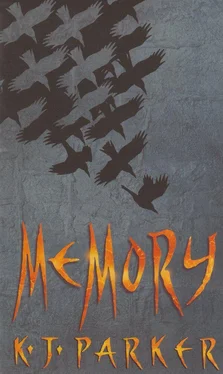K Parker - Memory
Здесь есть возможность читать онлайн «K Parker - Memory» весь текст электронной книги совершенно бесплатно (целиком полную версию без сокращений). В некоторых случаях можно слушать аудио, скачать через торрент в формате fb2 и присутствует краткое содержание. Жанр: Фэнтези, на английском языке. Описание произведения, (предисловие) а так же отзывы посетителей доступны на портале библиотеки ЛибКат.
- Название:Memory
- Автор:
- Жанр:
- Год:неизвестен
- ISBN:нет данных
- Рейтинг книги:5 / 5. Голосов: 1
-
Избранное:Добавить в избранное
- Отзывы:
-
Ваша оценка:
- 100
- 1
- 2
- 3
- 4
- 5
Memory: краткое содержание, описание и аннотация
Предлагаем к чтению аннотацию, описание, краткое содержание или предисловие (зависит от того, что написал сам автор книги «Memory»). Если вы не нашли необходимую информацию о книге — напишите в комментариях, мы постараемся отыскать её.
Memory — читать онлайн бесплатно полную книгу (весь текст) целиком
Ниже представлен текст книги, разбитый по страницам. Система сохранения места последней прочитанной страницы, позволяет с удобством читать онлайн бесплатно книгу «Memory», без необходимости каждый раз заново искать на чём Вы остановились. Поставьте закладку, и сможете в любой момент перейти на страницу, на которой закончили чтение.
Интервал:
Закладка:
'What was that you were humming?' she said.
'Sorry, I didn't realise.' He felt embarrassed, to be caught humming in public. 'Just a song I heard somewhere. You know what it's like when one gets stuck in your mind.'
'Like getting something wedged between your teeth,' she said. 'I know exactly what you mean.'
Poldarn thought for a moment. 'You didn't recognise the tune, then?'
'You hum very badly,' she told him, 'always did. It was endearing when you were very young.'
'It's a song about crows in trees,' he said. 'That's all I know about it.'
'Oh, that song,' she said. 'My mother used to sing it when I was a small child. I never liked it much.'
He grinned. 'I must've liked it a lot,' he said. 'It was practically the only thing I could remember, when I woke up that time.'
'Oh.' She looked at him, face blank. 'That's odd, I don't remember ever hearing you singing or whistling it.'
'I wonder where I picked it up,' he said. 'Not that it matters. It's just that I suddenly remembered the last line, just now. Of all the things to remember-'
'Or you may have heard it since, somewhere,' she said. 'It's a very common song, people sing it all the time.' She sighed. 'Apparently, Cleapho's going to be at this dinner party, assuming he gets back from Tulice in time.'
'Cleapho,' Poldarn said. (The guests are beginning to arrive.) 'What do I need to know about him?'
She counted off on her fingers. 'He controls the Treasury and most of the civil service, which is fine because it saves Father a lot of work he doesn't like doing; he also controls the army, now that Muno Silsny's gone-he killed Muno, of course, but we can forgive him that, I suppose; but he doesn't have any support in the Amathy house, which is why they're coming to dinner. I'm not sure why he wants to be Emperor; it may sound odd, but you don't make it as far as Father or Cleapho unless you actually have a strong motive. In Father's case it was simply staying alive that bit longer, but Cleapho-deep down, I have a nasty feeling that he believes in something. Not religion per se, gods and stuff; but I think he believes in religion in a sort of abstract sense, which is rather worrying. I think he wants to do things with the Empire, rather than just having it. He was at school with you, of course, but I think you already know that. He was very close to-well, Feron Amathy, a year or so back, but something went badly wrong and threw out all his plans, which is how Father was able to get his foot in the door. He means to kill us all, probably just because he feels we make the place look untidy. That's about it.'
Poldarn shrugged. 'Most of that went over my head, I'm afraid,' he said. He hesitated, then asked: 'How old is Feron Amathy? He seems to have been around for years.'
She didn't answer.
Why am I here? he asked himself.
It was dark; the curtains were as thick as armour, proof against even the sharpest point of light. He'd hoped to be able to snatch an hour's sleep before the ordeal of the dinner party, but apparently not; instead he lay on his back on the bed and stared at the darkness where the ceiling could be assumed to be.
Why am I here?
That was too complex a question, so he broke it down into smaller pieces, splitting off How did I come to be here? since most of that had been other people's doing. What remained was Why did I leave Dui Chirra and head for Torcea? He still couldn't make much headway with it.
He could remember quite clearly what the answer used to be. He'd come to Torcea because he was fairly sure he'd find Tazencius here; and he'd very much wanted to kill him, for some reason that had blurred somewhat in the intervening time. As far as he could recall, the justification was that Tazencius was to blame for everything bad that had happened to him; Tazencius had sent to the far islands for a weapon, and Halder had sent him his own grandson, to be sharpened, burnished and used. Tazencius had put him through school and set him up in business as the most evil man in the world. It was all his fault.
That lie had kept him moving and motivated as far as Falcata; at which point it fell to bits like an old rotten tree stump, though he'd pretended he still believed it. Since leaving Falcata, he'd been more concerned with running away than with arriving anywhere, right up until the moment he'd blundered into Ciana (who was really his old school chum, the prince Turvo) in the woods. Even then, if he was honest with himself, he'd only asked for a lift to Torcea because he needed to specify a destination, and he'd still been kidding himself about what he was planning to do.
Now here he was, in Torcea, in Tazencius's house; and killing Tazencius was no longer even a daydream. Instead, apparently, he'd come home. Maybe that was because, having run out of people to lie to, he'd had a go at lying to himself, and failed; at which point, somehow, inexplicably, the game was over.
So: what am I going to do now?
That was an even harder question. He had no idea what the answer might be. What he wanted to do was escape, yet again; but he'd finally been forced to come to terms with the fact that he was the King of the Snails, that whenever he tried to run away, he had no choice but to take his home with him.
So: eventually, after enduring unspeakable hardships and battling overwhelming odds, here he was, and he had no idea what he wanted to do next. Absurd; because an easier man to please didn't draw breath. How absurdly happy he could've been, digging mud at Dui Chirra or staring into the colliers' fire at the charcoal camp, or mindlessly following the pattern of chores assigned to him before he'd even been born, if only he'd been a fieldhand's son at Haldersness rather than the heir apparent. Instead, here he was: an expensive but obsolete piece of equipment, hung up in the rafters because nobody had any use for it any more. He didn't even have a use for himself. The only person who wanted him, apparently, was his wife, Tazencius's daughter, and she only wanted him as an ornament or curio.
A dog running through a cornfield with a burning torch tied to its tail. Was the dog to blame, or the man who made and attached the torch? Was it really possible that all the false, forged prophecies had actually come true, out of spite, and that he genuinely was Poldarn, the god in the cart? He grinned; he could dismiss that one out of hand, because gods didn't exist. Poldarn, he knew for a fact (because Copis had told him, or someone else), was an unmitigated fraud, invented by greedy monks to boost offertory revenues. Unless, of course, he'd created the god himself without even meaning to, like a careless sorcerer accidentally summoning the wrong demon.
He thought: The crows are beginning to arrive, because someone's set out a convincing pattern of decoys. Now that was fair comment; he'd been tricked and beguiled here just like the thousands of birds he'd drawn into his killing zones, back in the fields at Haldersness. He'd come expecting to kill, and now What makes a good decoy? Why, familiarity, which itself is born of memory. The crows see what look like a mob of their own kind pitched among the pea-vines. But there the comparison ended. Whatever had drawn him down here, it wasn't the search for his own memories. He'd been trying to run away from them all along.
Even so; they were starting to arrive, wheeling and turning in to the wind, gliding and dropping into the killing zone, all the old crows from the song. The question was: had he come here drawn by the decoys, or was he the pathfinding scout, leading the rest of the flock? What if (What if there was a traitor in the flock-one crow who deliberately led the rest down onto the decoys, into the killing zone? There never could be such a creature, of course, since all crows shared the same mind, just like the Haldersness people. But what if a crow lost its memory, mislaid its share of the group mind; and, while its mind was empty, was persuaded or tricked into turning traitor? What if one crow led the others down onto the bean field, and it turned out to be the cinder bed of a volcano, or the decoy pattern of the boy with the bucket full of small stones? Would that, he wondered, meet the criteria for a moment of religion?)
Читать дальшеИнтервал:
Закладка:
Похожие книги на «Memory»
Представляем Вашему вниманию похожие книги на «Memory» списком для выбора. Мы отобрали схожую по названию и смыслу литературу в надежде предоставить читателям больше вариантов отыскать новые, интересные, ещё непрочитанные произведения.
Обсуждение, отзывы о книге «Memory» и просто собственные мнения читателей. Оставьте ваши комментарии, напишите, что Вы думаете о произведении, его смысле или главных героях. Укажите что конкретно понравилось, а что нет, и почему Вы так считаете.












